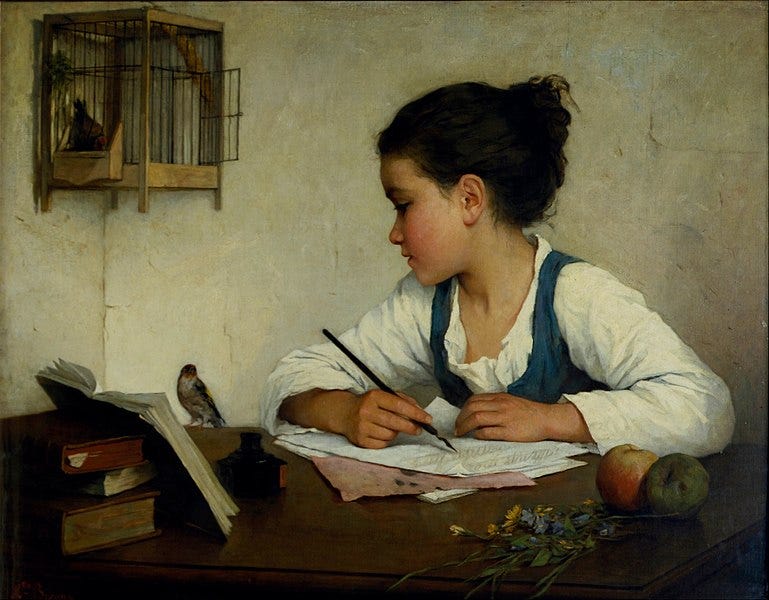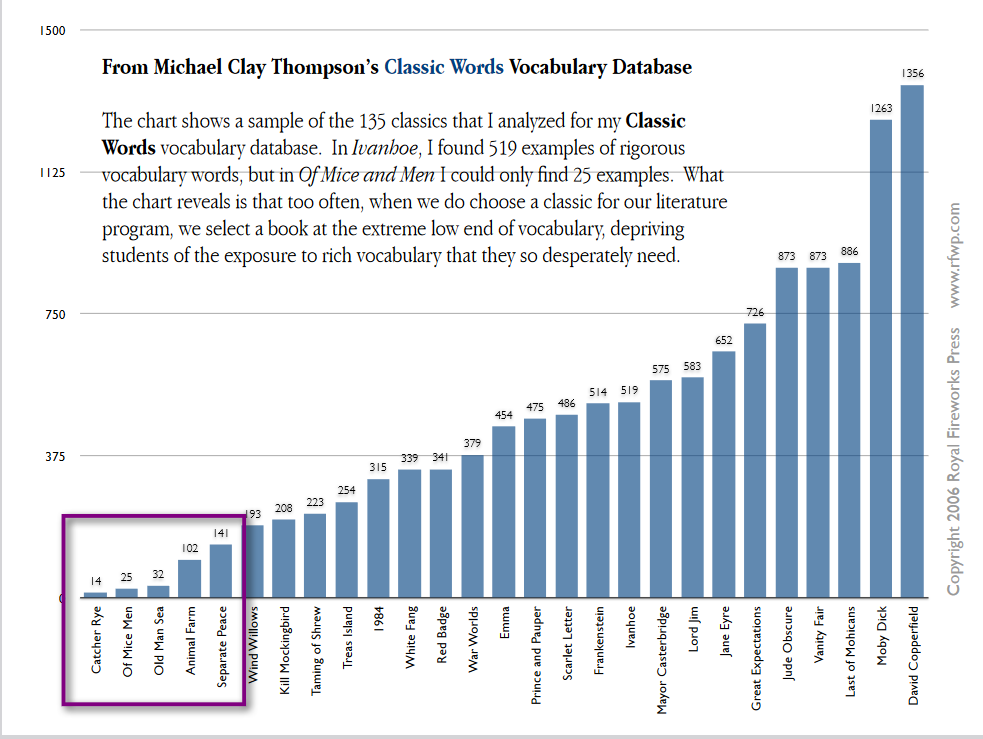Raising Writers Against the Machine
Doubleplusgood, three-dimensional writing, and a contest
“Child, to say the very thing you really mean, the whole of it, nothing more or less or other than what you really mean; that's the whole art and joy of words.”
― C.S. Lewis
Last summer I organized a short story contest for young Canadian writers and was bowled over by their ability to capture readers’ attention, striking language skills, and unique story-telling abilities. The focus was “freedom”, with some writing fictional stories about the yearning for freedom - from the perspective of a flock of chickens plotting an escape - and others recounting factual events of painful loss of freedom - such as young unvaccinated cadets being marked with a sharpie to ensure that they did not board a Hercules training flight along with the cadets who had complied. I had expected to encounter creativity, but not to be so fundamentally moved by their stories. I often found myself laughing aloud to their clever turns of phrase, or moved to tears by their descriptions of the cutting loss of freedom. Skilled language use gave these young writers the power to move hearts. Is this a power we are willing to abdicate to the soul-less void of AI?
This may appear a trivial point on the surface; after all we are made to believe that AI tools offer just one more avenue to simplify word processing based on predictive modelling. Alternatively relying on these tools could prove to be the last straw that will break our ability to use language with accuracy, authority, and creativity. And thus by extension crumble what makes us essentially human. By abdicating language, we abdicate humanity.
I am a bit flabbergasted that the conversation surrounding the rapid rise of AI seems to focus primarily on potential job losses, rather than the destruction of our human fabric. Justin Hanagan recently referred to a New York times piece by Ezra Klein on the “Matrix” theory of the mind. Klein lays out what the internet has done to our minds so far, decimating powers of attention, concentration, and contemplation. If the internet has the capability of scrambling our attention and cognition beyond recognition, what do we expect to happen when we infuse AI into this already desperately dehumanized situation?
There are several writers who speak clearly to the impact that the Age of the Machine is having on our minds, souls, and environment, and I feel encouraged reading the essays by
,,, and . Yet I also realize that these are the reflections of writers who are profoundly thoughtful and deliberate in their life choices. As a homeschool educator I have my eyes trained on the younger generation, which needs to be equipped for living a life grounded in reality in an overbearing Machine age.It will take deliberate rejection of practices that remove us from our basic humanness and a fierce and purposeful engagement with counter-cultural practices. Such as writing. Creating rich, unique, and specific language grounded in reality has now entered the counter-cultural realm.
Arriving at doubleplusgood
“It's a beautiful thing, the destruction of words. Of course the great wastage is in the verbs and adjectives, but there are hundreds of nouns that can be got rid of as well… Or again, if you want a stronger version of 'good,' what sense is there in having a whole string of vague useless words like 'excellent' and 'splendid' and all the rest of them? 'Plusgood' covers the meaning, or 'doubleplusgood' if you want something stronger still...In the end the whole notion of goodness and badness will be covered by only six words--in reality, only one word.
George Orwell, 1984
In Orwell’s classic, language is systematically decimated by Big Brother. It appears we are not in need of tyrannical government to strangle our powers of language, we readily make this choice by outsourcing it to AI. We are already outsourcing our memory to a technology of forgetfulness, hastening the withering of culture. Our skills have been automatized to such an extent that we are losing the ability to perform tasks unassisted by technology, leading to dangerous situations (such as pilots forgetting how to fly without auto-pilot). Adding AI language tools into the mix of dehumanizing tech is an Orwellian dream come true.
What do we expect to happen if we cease to grapple with language ourselves, if we delegate the succinct expression of our ideas, if we fail to actively exercise the beauty and power of language? Quoting Iris Murdoch,
states, “words are the most subtle symbols which we possess and our human fabric depends on them…The living and radical nature of language is something we forget at our peril.”The downward trend toward the “doubleplusgood” of simplified language has been on a steady march in the educational system. Students expressive range is kept within grade level vocabulary lists - or the best “National Vocabulary Prevention Program” as educator Michael Clay Thompson calls them – and classic books that contain a rich cornucopia of language, have been pulled from curricula because they are deemed too complex, too inaccessible, or simply irrelevant.
As this classic word chart by Michael Clay Thompson shows, those classics which are still taught in schools hold a mere vestige of the vocabulary which was once considered essential for good communication1.
A wide-ranging and rich vocabulary is fundamental to both reading comprehension and writing. Students who don’t know many words, can’t write many words. Knowing more words helps students process information more quickly, because prior knowledge of vocabulary lightens the load on working memory. The breadth and depth of a student’s vocabulary moves in tandem with their capabilities for abstract thinking. Each new word opens up a new pathway and leads to better expression of their own thoughts, as well as understanding others.
Language takes work. It takes time, effort, and deliberate thought to express ideas. This work not only produces captivating writing, it forms the writer in the process. Discussing the importance of poetry,
notes, “Poetry matters because it tells us how to love words and use them well. The same is just as true (maybe more true?) for children in their formative years, which is why it's also just as essential that we use the right words well, that we continue to craft them ourselves instead of lean on AI, and let good words form us.”AI tools represent the biggest heist on the human language this far. Earlier this month Sudowrite launched Story Engine. Nikki Mains reports that it is,
… “an AI tool for writing long-form stories.” Among its laundry list of promises, Sudowrite says it can generate “a page of words in less time than it takes to make your coffee.” The company’s site shares numerous tutorials about how Sudowrite can create the so-called author’s plot points, character arcs, and themes in one “magic AI canvas.” It will even go so far as to name the characters and create descriptions “to help your readers connect to your characters and feel like they’re really ‘there.’…It’s based on OpenAI’s GPT-3, it’s just tweaked and trained to specialize in the death of the author.
Again it is worthwhile asking, what do we expect to happen to students’ language abilities if we outsource production, analysis, and expression to AI tools? “The death of the author” is only the surface casualty. At a deeper level lies the impending death of language. It may be a decade or two removed, but why would we willingly, and eagerly, direct our feet along that path?
If we are willing to decide that this is not the path we want to follow, then we need to ask what the alternative is, and how it can lead us to be more fully grounded in reality, more creatively engaged with language, and by extension more fully human.
Three-dimensional writing
While leaving the green of our weekly track and field practice, I was conversing with the sports coach, who also happens to be a pastor, and has been leading the training of competitive athletes for more than a decade. He spoke with the passion of a person filled with learned conviction: “Kids are three-dimensional beings. You have to reach them physically, in the mind, and in the heart!” It struck me right then that this mapped on to what rests at the core of effective, creative, and expressive writing.
Writing too can be viewed as three-dimensional. It requires attention to reality (the physical), ability to rigorously apply the mind, and filtering language through the heart.
In Too Many Words, and Not Enough ,
explains how attention to reality is cleaved to language:Were we to properly attend to the world, its particularities and distinctions would emerge, and we would be impelled to call these new and emergent and unfolding dimensions of the world by their names or search for the fitting metaphor or otherwise learn to speak adequately if not exhaustively about what we have seen (or heard, or felt, or tasted, etc.)
In that scenario, care, attention, and language bind us to the world.
Reality and language have been bound together since the Garden of Eden:
“Out of the ground the Lord God formed every beast of the field and every bird of the air, and brought them to Adam to see what he would call them. And whatever Adam called each living creature, that was its name.”
Genesis 2:19
L.M. Sacasas observes that as we have become increasingly removed from our natural physical surroundings, we have also lost the vocabulary of the senses to describe them. Thus we are experiencing a shrinking lexicon of the senses along with a diminishing inventory of words to describe flora and fauna.
Spending time in nature, observing, attending, and grasping at the right words to express our observations is an exercise in reclaiming the origins of our language. This attention to nature and developing the ability to name, with accuracy and specificity, the plants, animals, and natural phenomena we observe has the vivifying side-effect of increasing our care and love of nature, and hopefully also our commitment to protect its beauty and diversity.
Writing also requires the ability to rigorously apply the mind. Poets in particular are intimately familiar with this rigor and adroit at harnessing words. C.S. Lewis admonishes writers to apply their minds to eliciting a reader’s reaction:
“In writing. Don't use adjectives which merely tell us how you want us to feel about the thing you are describing. I mean, instead of telling us a thing was "terrible," describe it so that we'll be terrified. Don't say it was "delightful"; make us say "delightful" when we've read the description. You see, all those words (horrifying, wonderful, hideous, exquisite) are only like saying to your readers, "Please will you do my job for me."
Would Lewis not be horrified that, not only are we neglecting our job as writers, but are passing it over completely to a producer of spiritless anti-language2 ?
Finally, writing requires us to filter language through the heart. To me this is one of the central reasons why AI is a mere babbler. None of the writing produced with AI tools is infused with human spirit or heartfelt expression. It is syllabic noise that emerges from a digital abyss - uninvested, uncreative, devoid of purpose, hope, and beauty.
In her post Why We’re Required to Find Beauty,
clearly lays out why beauty is necessary for humanity’s survival.Dostoevsky said that beauty will save the world. This is what he meant, I believe. Not that one look at a rose in bloom will make everyone feel a-okay, but that those glimmers of a baby’s laugh, the trees in bloom in early spring, and the creak of a rocking chair on the back deck will remind us that this — all this hardship around us — is not all there is. We live in the shadows, and yet the sometimes seconds-long shimmers of beauty hint at the actual reality worth living for. We’re called to notice those shimmers if we want to live. I’d say it’s required.
While beauty can at times be so overwhelming that the words to capture it elude us, language can also help us to perceive the beautiful more fully. If “beauty will save the world”, we need to invest ourselves in attending to it, expressing it, and sharing it. This can be achieved in a variety of ways including simple actions, spending time in nature, nurturing relationships, creating art, etc. Language has an inherent power and beauty. Rather than abdicating our language to the Machine, we should anchor our language in reality, develop our linguistic powers, and be fiercely protective of the AI’s attempted usurpation of the throne that defines us as humans.
Young Writers Against the Machine Contest
If you want to change the world, pick up your pen and write.
Martin Luther
Taking seriously
’ guiding ethos, “Any idea is only as good as its physical or tangible manifestation", I invite young writers to harness their language skills, apply their minds, and invest their hearts by writing a short story set in nature. This invitation is extended not only with the aim of raising and encouraging young writers against the Machine, but through the writers’ stories point towards the hope that “beauty will save the world”.Awards
The awards for the Young Writers Against the Machine Contest have been generously donated by ICG Bullion, and in the spirit of tangibility and tradition3 will be paid in 1 oz .999 silver coins4 !
There are two age categories: 9-12 and 13-16.
Each category will be awarded 1st, 2nd, and 3rd place.5



Winners will be announced on
on August 1st, 2023.What?
Write a short story set in nature (e.g. forest, field, mountains, tundra, desert, lake, ocean, etc.)
Stories can be fact or fiction
Stories must have a minimum of 750 words and a maximum of 1500 words
Stories will be evaluated by a panel of judges6
Stories will be judged on the basis of creative expression, storytelling, and language use
Who?
Students between ages 9 and 16 (two age categories: 9-12 and 13-16)
Only one entry per person will be accepted
Only single author stories qualify (no co-authored stories)
How?
Text can be typed or handwritten. Children who cannot type may have their completed stories typed up by someone else. If you would like to submit a handwritten entry, paste a clear photo into the text of the e-mail message.
Stories should be cut and pasted in the body of an e-mail, and sent to schooloftheunconformed@proton.me
No attachments will be opened.
Include student’s:
first and last name
age
mailing address
subscriber’s full name
Submit your entry before midnight July 14th, 2023
Submission Checklist:
I cut and paste my entry in the body of my e-mail to schooloftheunconformed@proton.me
I included my:
first and last name
age
and mailing address
subscriber’s full name
I submitted my story before midnight of July 14th, 2023.
My story is no shorter than 750 words and no longer than 1500 words
I added a title for my story
I checked my story for spelling and grammar mistakes
I wrote an original story and did not copy it from anyone7
Thanks to our sponsors!

If you would like to support the contest for Young Writers Against the Machine, please share and restack to spread the word. If you found this post helpful (or hopeful) consider supporting my work by becoming a paid subscriber, or simply show your appreciation with a ‘like’.
If you are up for an informative diversion, you can test your English vocabulary here. It takes just a few minutes to complete and provides an estimate of your acquired vocabulary (for English speaking adults between 20’000 and 35’000). It may also lead you to look up what in the world words such as hypnopompic, fuliginous, or tatterdemalion mean.
AI tools do not actually produce language. Language is an inherently human power and requires a creator. AI is a spirit-less void and does thus not produce language, but a form of ‘anti-language’.
Silver coins as prize money has just taken on even more relevance with the Bank of England’s announcement that CBDCs are “likely to be needed”.
Each coin has an estimated value of $30 US dollars. The silver coins are from Canada, the U.S., Austria, Australia, and South Africa.
Thanks to my youngest son, who took the photos with a backdrop of our 1859 pictoral edition of the Webster’s Dictionary.
The judging panel will be composed of experienced writers or teachers. If you are an experienced writer or teacher and would like to volunteer as one of the panel judges for the contest, please contact me at schooloftheunconformed@proton.me. Note: relatives of judges are not permitted to participate in the contest.
You may ask how it can be ensured that entries are original and not created with AI writing tools. My answer to that lies in what I call the “Windspiel Principle”. A couple of decades ago, my husband and I lived in a lovely Ottawa neighbourhood, and I wanted to hang up a beautiful windspiel decoration on our veranda. I knew that there was a chance that it would be stolen. I could have refrained from hanging it up, but then the beauty would have been kept from the passers-by who frequently admired it. I would rather someone steal the windspiel, than not share its beauty. In the same way I would rather run a contest with the possibility that a rotten apple may cheat, than withhold the opportunity from all the contestants to share their beautiful writing. On a positive note: the windspiel was never stolen.










Like with the digital detox, I love the pragmatism of your Substack.
My concern with the fiction writing of AI is of it surpassing us all. How will you and I handle it when we read a truly beautiful story, maybe the most beautiful story we've ever read, then realize it was written by AI? This makes me shudder.
This is so inspiring, even for this old greying writer in dark South Africa. Yes, it's literally dark here, throughout this cold winter due to the evils of our world. I guess alll that keeps me going is my faith in Jesus Christ and reading articles against the machines, such as yours. Again, thank you!